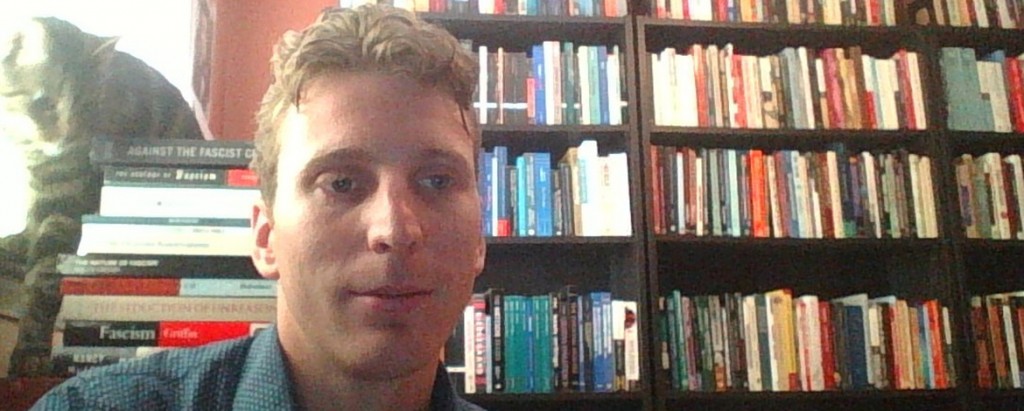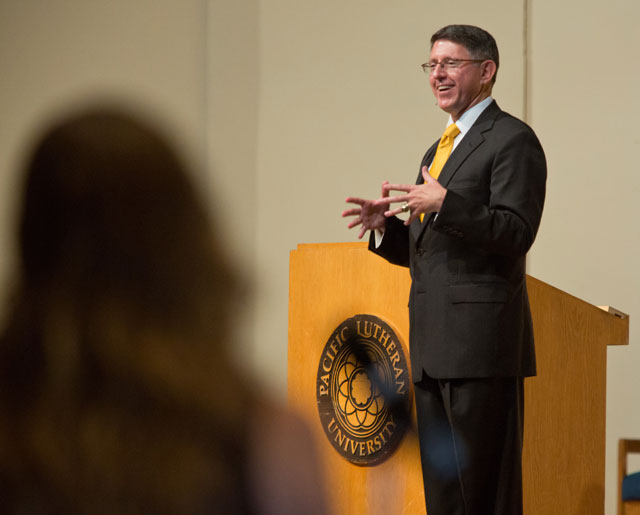Page 54 • (702 results in 0.097 seconds)
-

creativity, writing a column for The Mast that was based on his experiences studying abroad. Evanishyn’s overseas experiences included a year in Aix-en-Provence, France, a Tacoma-sized city located about 20 miles from Marseilles. There he studied subjects ranging from European literature to the ecology of the Mediterranean Sea, all the while soaking up the majestic ambiance of France’s wine country. “It’s a really beautiful area,” he said. “There’s a very dry, beautiful mountain (Mont Sainte-Victoire
-

, presented at the prestigious 2014 Race & Pedagogy National Conference in Tacoma Sept. 25-27, among more than 2,000 local, regional, national and international participants (including a large contingent from Pacific Lutheran University). Chaired by Jenny M. James, PLU Assistant Professor of English, and including Michael Benveniste, Assistant Professor of English at the University of Puget Sound, the panel in which Davidson participated reconsidered the legacy of civil rights in the university literature
-

undergraduate. “I didn’t really know what I wanted to study. Philosophy was something I had always interacted with but didn’t really have a name for. Then I took this philosophy class and it was like oh, this is what I have been interested in.” Dr. Arnold says, “Broadly speaking, all areas of the academy and education have elements of philosophy to them. You could do the philosophy of just about anything: physics, religion, literature etc. I don’t think philosophy is done only in its department. The way it
-
the idea for the book while they were doing research together at the Folger Shakespeare Library a few years ago. “We were doing some research into handwriting and paleography, but we realized that we both had an interest in consciousness and what it meant to be awake and what it meant to be asleep, and the philosophical implications of that, as they manifested in literature.” Professor Nancy Simpson-Younger Forming Sleep: Representing Consciousness in the English Renaissance CoEdited by Nancy
-
inducted into our academic community. This ceremony, with its ritual elements recalling the medieval ceremonies of the first European universities, welcomes you as worthy colleagues. In addition to your fellow students, seated around you are the faculty, staff, administrators, and regents of PLU, together with elected representatives of the 581 congregations of the Evangelical Lutheran Church in America in the Pacific Northwest who serve in a body called the PLU Corporation, which confirms the members
-
teaching career in earnest. After spending most of my life in the Midwest, I loved being out on the west coast, especially the San Francisco Bay Area. Being a composer working with programmers, engineers, artists, and game designers taught me a lot about collaboration and teams. We were trying to come up with unique game worlds. Music and sound were key elements in this process. So whether it was a shooting game that needed an action/thriller score, a Medieval fantasy game that required an epic
-
and African American Studies program at Loyola University Maryland, while contributing courses to its gender studies program. I also participate in relevant student organizations addressing LGBT rights, sexual assault, and other important concerns. My feminist literature courses continue to be my most intellectually rewarding. In fact, when I interviewed for my job at Loyola, I pitched my dream course: a study of “dead women talking.” From Madeline Usher to Toni Morrison’s Beloved, these strange
-

important to help them understand that the idea of the liberal arts is rooted in ancient Greek and Roman culture and the term describes those skills and subjects that were deemed necessary for the education of free people—libera being the Latin root for liberty. In the medieval period, those arts were identified with seven subjects—grammar, rhetoric, logic, arithmetic, geometry, music, and astronomy. I like to refer to these by name to emphasize that the liberal arts have always included the sciences
-
stimulate creativity and problem-solving abilities through the use of modern biochemical techniques. Prerequisite: CHEM 403. (3) CHEM 410 : Introduction to Research An introduction to laboratory research techniques, use of the chemical literature, including computerized literature searching, research proposal, and report writing. Students develop an independent chemical research problem chosen in consultation with a member of the chemistry faculty. Students attend seminars as part of the course
-
focuses on the adaptation of the Tsuji-Wacker oxidation to be used in an undergraduate lab. The main purpose for adapting this reaction is to find an environmentally-friendly hydration method that can be used to selectively synthesize the Markovnikov and anti-Markovnikov forms. Using a literature reference, it was discovered that replacing the typical pd (II) catalyst with an iron catalyst yielded a similar result. Using an iron catalyst as opposed to a palladium catalyst would be very beneficial as
Do you have any feedback for us? If so, feel free to use our Feedback Form.


